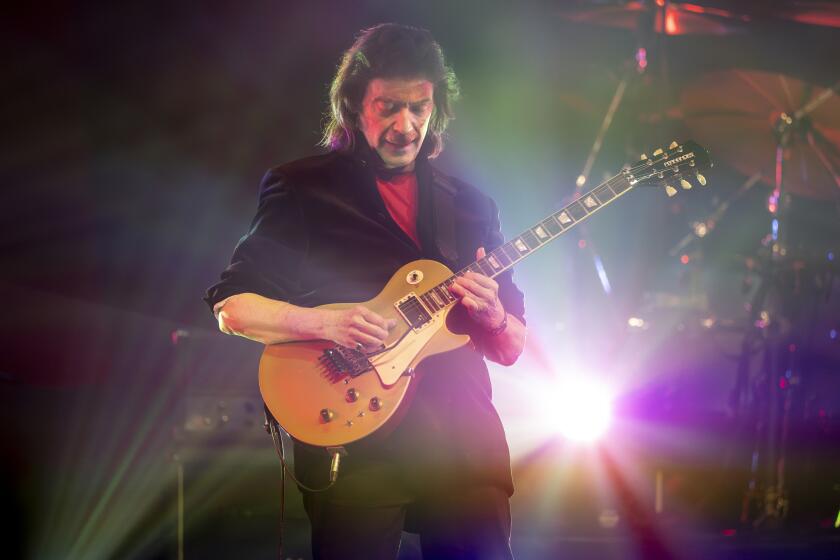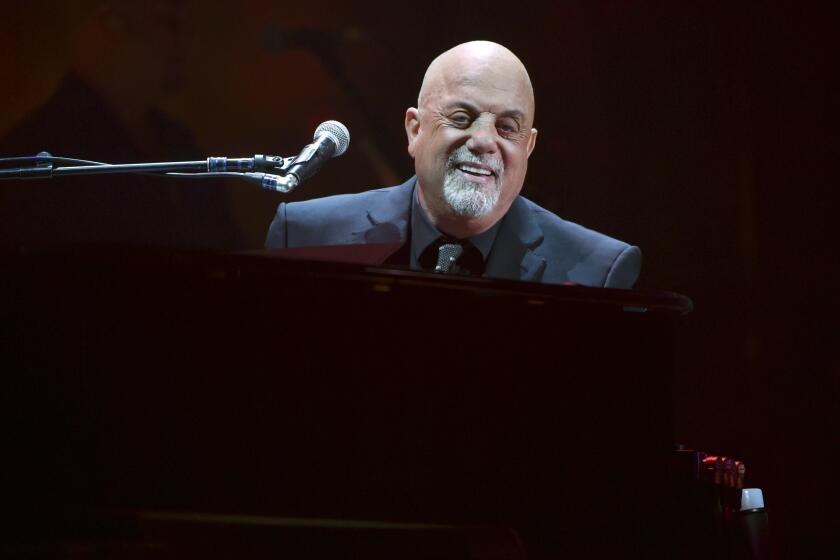Whitney Houston appreciation: Her tone in ‘I Will Always Love You’ was pure and game-changing
The voice floats confidently but quietly in the first few lines of Whitney Houston’s version of “I Will Always Love You,” the song for which the superstar vocalist, who died Saturday of undetermined causes at the Beverly Hilton Hotel, will always be remembered. Hear it rush out of the radio unexpectedly, and it has the power to transform your world.
“If I should stay I would only be in your way,” sings Houston in those opening bars, minus any instrumentation, as if into an abyss of loneliness. “So I’ll go, but I know I’ll think of you every step of the way.”
She pauses, as if to muster the strength to confess what’s coming next.
Photos: Whitney Houston | 1963-2012
If you haven’t heard it in a while, go back and listen, and wonder at Houston’s pure tone, one that at its peak could not only hit a note and gracefully sustain it but also inject it with just enough flair and nuance to reinforce her control without pressing the point. She knew she had a voice and that it mattered. And with this knowledge and confidence in her gift, she inspired generations of belting singers who followed. She created not only a movement but a template, one that powered female-led R&B into the center of pop music marketplace, where it exists within not only the music of Beyoncé and Rihanna but also in how contestants on singing shows such as “The Voice” and”American Idol” try to impress the judges.
It’s two words — the “I” at the beginning of the line, and the “you” at the end — held for a few beats longer than most others could sustain but with ironclad control, that seals the deal, a pair of one-syllable words so convincing that they should have won her an Oscar and a Grammy. She sings the words differently throughout; at first, it’s with love, then with conviction, then with desperation, a drama that unfolds across four minutes. She shaped notes so that they sounded like floating hearts one minute, only to explode as the emotion turned from love to loneliness.
Her final refrain is nearly whispered and filled with resolved heartbreak.
PHOTOS: Grammys 2012 show performances
And did those notes float: At the height of the single’s popularity through the 1992 holiday season and into 1993, “I Will Always Love You,” originally written by Dolly Parton but reportedly delivered into Houston’s life via Linda Ronstadt’s 1975 version, was the No. 1 song all over the world. From Sweden and Norway and throughout Europe and into Africa, and in many countries it remained at the top for months. In Japan, the song stayed on the charts for over six months.
Impressive, yes. But the effect multiplied as the energy of that single human voice sprouted in the hearts of millions.
As it spread, girls coming of age in the ‘80s and ‘90s discovered a kind of emotion that could be conveyed with the energy and emotion of song, by letting go of the insecure self-editor that tries to silence that voice. Yes, Houston’s particular essence was perhaps unmatchable, but within it lay the freedom to try — to turn up the stereo, grab a hairbrush and stand in front of the mirror just to see what came out. And when these girls did so, whether their names were Jennifer Hudson, Jennifer Lopez or the millions of nonfamous others, they absorbed the message of the lyrics: “Learning to love yourself is the greatest gift of all.”
PHOTOS: Grammys 2012 red carpet
On Saturday night at the annual Clive Davis party at the Beverly Hills Hilton, where little more than eight hours earlier Houston was found dead, British singer Jessie J, 23, described the influence that Houston had had on her. The young vocalist and songwriter, who grew up an ocean away, talked of singing along to Houston’s music in her bedroom, and you could hear those private moments loud and clear during a stunning rendition of “Who You Are.”
Alicia Keys, who, like Houston, was first signed by Davis, conveyed the wonder of Houston’s influence during the party: “You think about how this person touched you,” she said as she dotted out a sad melody on the piano. “You form a friendship, a sisterhood, a bond. You see how incredible they really are.
“I started to think back,” continued Keys, 31, “think about just how much this person has touched your life, and it’s incredible, it’s incredible. I mean, from being a little girl — like a little girl growing up — watching this beautiful, incredible woman, who was a girl at the time too.”
PHOTOS: Grammys 2012 fashions mostly elegant with a wacky edge
Fifty-five million records sold in America. A voice that carried not only Houston’s spirit, but the genetic code of gospel-singing mother Cissy Houston and cousin Dionne Warwick, with godmother Aretha Franklin’s influence. Hearing Whitney Houston’s phrasing — the way in which she breathed the lyrics out — you could hear both the church and the playground in her.
Though she may be remembered for her ballads — “Saving All My Love for You,” “Greatest Love of All,” “Where Do Broken Hearts Go” — she could bring the funk too. In a landscape in which Michael Jackson, Madonna and Prince were duking it out for America’s affections and George Michael was offering romance, Houston jumped in with a couple of dance-floor bangers that not only brought a defiant confidence but pushed her voice in more gospel-oriented ways: “Love Will Save the Day” and “I Wanna Dance With Somebody” delivered her message loud and clear.
Houston’s fame grew beyond radio and onto the screen, where she delivered a blockbuster performance in “The Bodyguard” as an actor and as the soundtrack’s star, and in the process proved that a black woman could drive a box office hit. As her star rose, we started watching her closer, and as the ‘90s gave way to the ‘00s, it soon became evident that something was amiss — that the delays between albums, her failed appearances and airport security run-ins were starting to affect her talent.
And then we watched as she self-destructed — on television, no less. We saw how delicate an instrument a crystalline voice can be. Once so powerful that at its peak was a portal into the mystic, that miracle was defenseless against the kind of abuse that was showcased week in and week out on “Being Bobby Brown,” the reality show with her then-husband that not only offered tragic evidence of her decline but served as a template for an entire subgenera of car-crash reality shows. We learned that a voice was nothing without a body to support it; that even the most fantastical of them is, in the end, mere flesh. Her faltering vocal cords became the physical manifestation of our heartbreak.
Full coverage: Whitney Houston | 1963-2012
That failure, sadly, will forever be associated with her legacy. The images that we carry of her are hard to reconcile with the sound she created. But that’s where “I Will Always Love You” comes in. Put it on. Turn it up. Close your eyes. Houston’s voice, mere hours after her death, has already proved it can outlive her body. Even if her humanity couldn’t handle that tone, posterity certainly can.
More to Read
The biggest entertainment stories
Get our big stories about Hollywood, film, television, music, arts, culture and more right in your inbox as soon as they publish.
You may occasionally receive promotional content from the Los Angeles Times.






